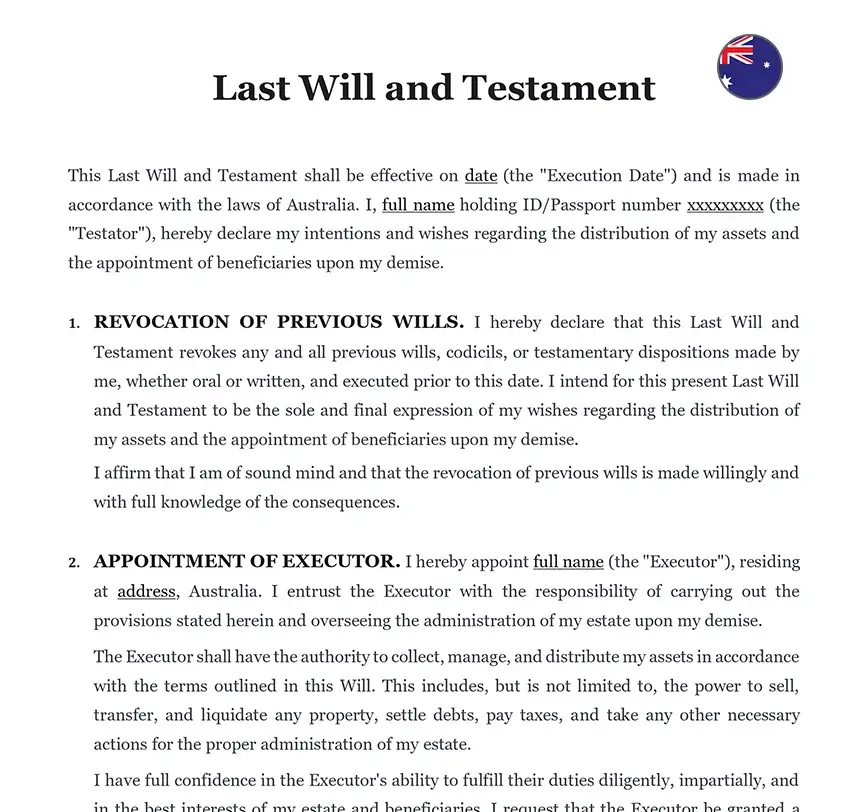Ready to use legal template
Drafted by experienced lawyers
Compliant with Australian law
Ready to use legal template
Drafted by lawyers
Compliant with Australian law
Home › Family law › Testament
Learn more about Testament in Australia
A Testament, commonly referred to as a Last Will and Testament, is a legal document that outlines how a person’s assets, property, and affairs should be handled and distributed after their death. It allows individuals to appoint executors, name beneficiaries, and provide specific instructions for the care of dependents or guardianship of minor children. In Australia, having a valid testament ensures that your wishes are respected, minimises potential disputes among heirs, and helps your loved ones avoid lengthy and costly legal processes. At Themis Partner, we provide a professionally drafted Testament that complies with Australian legal standards and is easy to customise according to your needs. Download our Testament today fully editable in Word format, so you can plan your estate with confidence, clarity, and peace of mind.
Table of contents
-
-
What is a testament in Australia?
-
What is the purpose of a testament estate planning in Australia?
-
What should it include?
-
What are the implications of not having a testament in Australia?
-
Can a testament be challenged or contested?
-
How can a testament be amended or revoked in Australia?
-
How are executors and trustees appointed in Australia?
-
What is a testament in Australia?
In Australia, a testament refers to a legal document, commonly known as a will, that outlines an individual’s wishes regarding the distribution of their assets and the management of their estate after their death. A testament allows individuals, known as testators, to specify how their property and possessions should be distributed among beneficiaries and appoint executors to administer their estate according to their instructions.
What is the purpose of a testament estate planning in Australia?
The primary purpose of testament estate planning in Australia is to ensure that a person’s assets and property are distributed according to their wishes upon their death. By creating a testament, individuals can:
1. Provide for their loved ones:
A testament allows individuals to provide financial support and security for their family members, including spouses, children, and dependents, by specifying the distribution of assets and resources.
2. Avoid intestacy:
Without a valid testament, a person’s estate may be distributed according to intestacy laws, which may not reflect their preferences or adequately provide for their beneficiaries.
3. Minimize disputes:
A well-drafted testament can help minimize conflicts and disputes among family members or other potential beneficiaries by clearly outlining the testator’s intentions and instructions for the distribution of their estate.
4. Appoint executors and trustees:
A testament allows individuals to appoint trusted individuals or professional advisors as executors and trustees to manage their estate and carry out their wishes effectively.
What should it include?
A comprehensive testament in Australia should include the following key elements:
| ➤ Identification of the testator: The testament should begin with the testator's full legal name and address to establish their identity. |
| ➤ Appointment of executors: The testator should appoint one or more executors to administer their estate and carry out the instructions specified in the testament. |
| ➤ Beneficiaries: The testament should clearly identify the beneficiaries who are entitled to receive assets and property from the testator's estate. |
| ➤ Distribution of assets: The testament should specify how the testator's assets and property should be distributed among the beneficiaries, including details of specific bequests, gifts, or legacies. |
| ➤ Residuary estate: The testament should address the distribution of any remaining assets, known as the residuary estate, after specific gifts and bequests have been fulfilled. |
| ➤ Guardianship of minor children: If the testator has minor children, the testament should nominate guardians to care for and make decisions on behalf of the children in the event of the testator's death. |
| ➤ Powers of executors and trustees: The testament may grant executors and trustees specific powers and authorities to manage the estate, including the power to sell assets, invest funds, and make distributions to beneficiaries. |
| ➤ Contingency plans: The testament should include provisions for unforeseen circumstances or changes in circumstances, such as the death or incapacity of beneficiaries or executors. |




